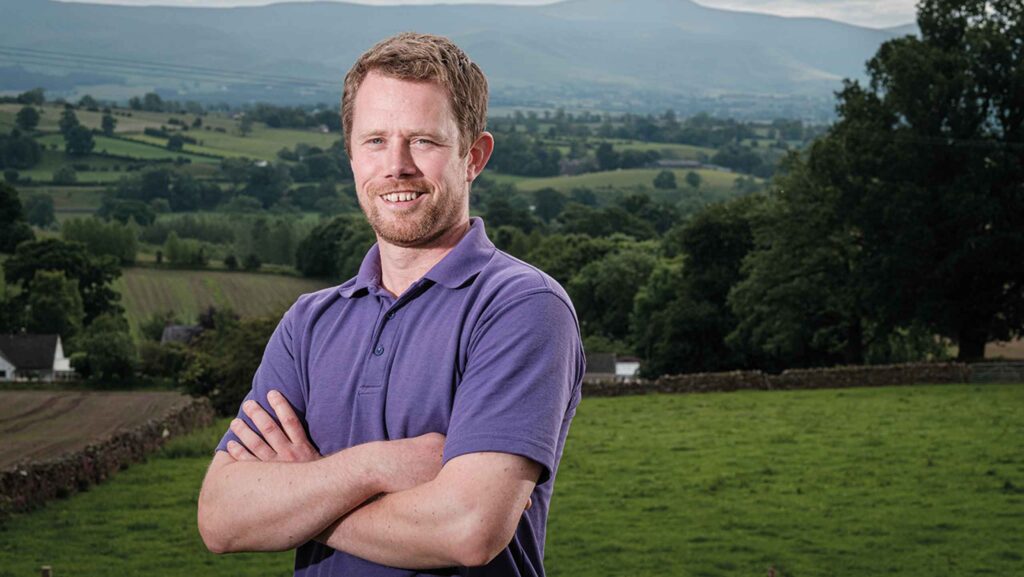Farmers Weekly Awards 2024: Grassland Manager of the Year
 James Tweedie © Jim Varney
James Tweedie © Jim Varney James Tweedie of South Dyke Farm, Penrith, Cumbria, is the Farmers Weekly Awards 2024 Grassland Manager of the year.
Grazing for 280 days a year on light Eden Valley soils is a competitive advantage that James Tweedie has exploited to grow his business.
Dry matter (DM) production has averaged 11.75tDM/ha over the past four years.
In a good year, his system uses less than £400 of supplemental feed (0.5t of parlour cake and 1.5t of silage) a cow a year.
See also: Farmers Weekly 2024: Grassland Farmer of the Year finalists
Farm facts
- 400 spring-calving cows
- 250ha, of which half is on an Agricultural Holdings Act tenancy
- Average lactation of 4,500 litres
- Friesians average 8.5-9% milk solids
- Milk sold to Arla
- 60 breeding bulls and surplus heifers sold annually
- Light, stony, free-draining soil
- 900mm rain/year
- Embryo transfer work done in elite cows
This is on a falling application rate of chemical nitrogen (N) – from 193kg/ha in 2020 to 130kg/ha last year – with no pre-mowing. Cows manage the pasture.
James’s father, Gordon, first used New Zealand Friesians in the 1980s. Now, the herd is based on pure New Zealand Friesians, pure Jerseys and a criss-cross of both, selling surplus heifers and 60 bulls a year.
Vision
James’s lean block-calving system takes best practice from New Zealand, Ireland (Teagasc Moorepark) and British operators, among others.
Cow numbers have increased almost 50% with limited infrastructural investment, meaning extra production translates into extra profit.
A new milking parlour – built in the middle of the grazing platform – has been the main depreciating investment in recent years.
The business model is only to produce milk if there is a margin, and an ethos that the team would rather put up electric fencing in the snow than chase slurry around and feed cattle inside.
Improvements
The past 10 years have seen James make steady improvements at the helm. Grassland management has been based on maintaining soil indices on good land, and improving support ground taken in-hand to support expansion.
Calcium lime has helped lift average soil pH from 5.6 to about 6.5 since 2011.
Empty rates for the herd were 20% in 2014, fell to 13% in 2019 and have averaged 8.5% since 2020. The six-week in-calf rate was 50% in 2014 and has run at 89-90% for the past four years.
The ratio of milk solids (MS) production to liveweight has steadily improved, lifting from 0.96:1, when cows weighing 478kg produced 461kg of MS, to 1.04:1, when 438kg cows produced 456kg of MS.
Consequently, comparable farm profit/ha (excluding rent and finance) increased by 140% a cow between 2018 and 2023.
Recent tweaks to the system have focused on establishing deeper rooting herbal leys to build in drought resilience and cut fertiliser requirement.
In a welfare-conscious move, cocksfoot margins have been drilled in 6ha of fodder beet grown for wintering half of dry cows, to give them a dry lie.
Future
James says his ideal year is growing 14t DM/ha and using 50kg chemical N/ha plus slurry by using grass, clover and herbs.
His aim is for 500kg cows to calve in a six- to-eight-week block and produce 450kg of milk solids/lactation from 450kg of concentrate, with 500kg DM of silage in November and December to extend the lactation.
He also prioritises longevity, with a target of 5.5 lactations a cow, which many already achieve.
With the help of genetic gain, James hopes to hit 520kg of MS from a 435kg cow and a 100% six-week in-calf rate.
Winning ways
- Maximising days at grazing to produce profitable milk
- Low replacement rate allows heifer sales
- Hitting target residuals eliminates pre-mowing
- Cutting nitrogen inputs through clover and herbal leys
- Good milk solids production from compact cows
- Low-cost and time-efficient system
- Conscious of the importance of staff
- Accepting of the benefits and limitations of the farm
- Excellent monitoring and management of costs and technical performance
What the judges say
“James has a clear vision and direction, understanding his competitive advantage and adding value through the sale of breeding stock. Smaller cows produce more milk solids per kilo of liveweight.”
The Farmers Weekly 2024 Grassland Manager of the Year Award is sponsored by Germinal
The Farmers Weekly Awards celebrate the very best of British agriculture by recognising hard-working and innovative farmers across the UK.
Find out more about the Awards, the categories and sponsorship opportunities on our Awards website.

